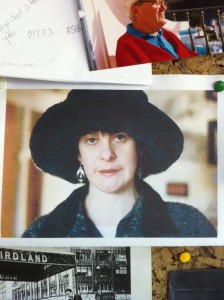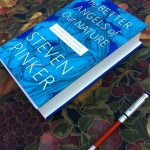Today marks a pivot in my life. Yesterday I retired from the Open University, after a long and productive career there. Today I become Vice-President of Wolfson College, where I’ve been a Fellow for many years and now become part of The Management (as it were).
The worst thing about leaving an institution, I discovered, is having to clear out one’s office. I’ve spent the last week shredding a mountain of stuff — the accumulated paperwork of a 40-year academic career. (So much for the paperless office. Abi Sellen and Richard Harper were right.) It’s said that if you fall from a high cliff, your life flashes before your eyes before you hit the ground. Well, much the same thing happens when you shred the documentary evidence of a long time in an organisation — all those committee papers, project reports, task-force agendas, visits and visitors, background for research papers, letters and memoranda from The Management, and so on.
One thing that struck me as I shredded was how much energy I had expended on so many different things; many of them fizzled out, as you’d expect, but a few of them yielded real benefits. With my colleague Nigel Cross, for example, I changed the way the university approached the teaching of technology, for example, from an approach that focussed mainly on machinery and the environment, to one that was centred on issues and values as well on technical subjects. With Jake Chapman and others I persuaded the university to embrace the PC revolution and to require our students to have access to a PC for many courses; with Martin Weller I launched the institution into teaching online: our first course attracted 12,000 students in its first year, and the OU now has upwards of a quarter of a million students online; and with Tony Hirst, Ray Corrigan, Andy Lane, Jeff Johnson and others launched the OU’s Relevant Knowledge Programme of short, online courses on fast-moving technological subjects.
What also struck me as I looked back was how lucky I have been. I’m a baby-boomer, born in 1946, and what looking back over the record of references and job applications and further particulars and promotions brought home to me is the extent to which I belong to a truly blessed generation. When I graduated (with a First) in 1968 I had about thirty job offers (as an experiment, I had gone to all the ‘milk-round’ interviews then run by large corporations). All of my engineering classmates in 1968 got ‘professional’ jobs, and some went on to have very successful careers in large companies. One of my sons is now the same age as I was when I got that lectureship and he tells me that of his cohort of friends and contemporaries, only he and one of his friends have what one might describe as meaningful work. When I got my university lectureship the first thing I did was to go out and buy a house in Cambridge. None of my son’s contemporaries has been able to buy a house, and for some it looks like being an unattainable dream. And nobody on a junior lecturer’s salary could nowadays afford to buy even a simple terraced house in Cambridge. I’ve had a secure, tenured job doing interesting work for four decades, something that already seems implausible in the modern economy. And, to cap it all, I get to retire on a decent pension, linked to my final salary. If that isn’t luck, then I don’t know what is.
All of which makes it ever more frustrating to see how my generation and the ones immediately succeeding it have comprehensively screwed up the prospects for my children and grandchildren.
 As I shredded, most of the time memories whizzed by in an interesting but untroubling blur. But then I came on a document that brought me to a shuddering halt. It was the minutes of the first committee meeting at which I came face to face with Sue, the woman who transformed my life. She was then a rising star in the University Administration, a talented, sassy, ambitious girl who was clearly destined for greater things. And as I read this anodyne record of discussions held and decisions reached I was transported back to the moment in 1986 when I sat in that Committee Room stunned by her beauty and easy grace and wondered if such creatures ever talked to mere academics. As it turned out, she did. I fell for her — hook, line and sinker — and to my astonishment she fell for me. We had twelve blissful years together, and two lovely children, before fate (as PG Wodehouse would say) slipped the lead into the boxing glove. She died from cancer nine years ago. Meeting her was the most wonderful unexpected benefit of working at the OU, and if I had got nothing else out of my career, that would have been enough to justify it.
As I shredded, most of the time memories whizzed by in an interesting but untroubling blur. But then I came on a document that brought me to a shuddering halt. It was the minutes of the first committee meeting at which I came face to face with Sue, the woman who transformed my life. She was then a rising star in the University Administration, a talented, sassy, ambitious girl who was clearly destined for greater things. And as I read this anodyne record of discussions held and decisions reached I was transported back to the moment in 1986 when I sat in that Committee Room stunned by her beauty and easy grace and wondered if such creatures ever talked to mere academics. As it turned out, she did. I fell for her — hook, line and sinker — and to my astonishment she fell for me. We had twelve blissful years together, and two lovely children, before fate (as PG Wodehouse would say) slipped the lead into the boxing glove. She died from cancer nine years ago. Meeting her was the most wonderful unexpected benefit of working at the OU, and if I had got nothing else out of my career, that would have been enough to justify it.
I’m the last cohort of employees to whom compulsory retirement age applies. From today, employers will have to make a case for making people stop at the statutory retirement age. I could have made a case to stay on, but decided against it: I had too many other things that I wanted to do. As a father of two children of university age, the idea of having a useful lump sum was attractive. And to have stayed on might also have blighted the prospects of younger colleagues, or — in a time of budget cuts — necessitated staffing reductions elsewhere.
 Besides, there’s something absurd about the idea of ‘retirement’ for academics. Most of them continue to do what they do, regardless of whether they have an institutional perch or not. In my case, I’m simply moving to another corner of academia, but even if I weren’t, an observer would be hard put to notice any difference in my daily routine. I’ll still be blogging, for example. My Observer column goes on. I have a new book
Besides, there’s something absurd about the idea of ‘retirement’ for academics. Most of them continue to do what they do, regardless of whether they have an institutional perch or not. In my case, I’m simply moving to another corner of academia, but even if I weren’t, an observer would be hard put to notice any difference in my daily routine. I’ll still be blogging, for example. My Observer column goes on. I have a new book coming out in January, and am already incubating its successor. And a courier has just delivered Steven Pinker’s whopping new book
, which I’ll have to read because the Observer wants me to do an email debate with him.
In other words: business as usual.

